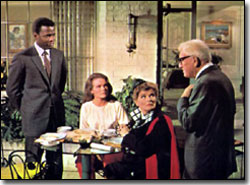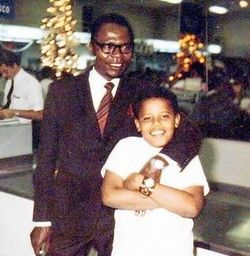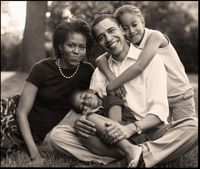While all the news shows were covering the Inaugural Balls this evening, Turner Movie Classics (known at my home as the Dead Movie Channel) re-ran a classic from 1967, Guess Who's Coming to Dinner.
It's a movie that has lived many lives. It won Spencer Tracy his 9th (and last) Oscar nomination — he died shortly after filming ended. It then killed Sidney Poitier's career as a Big Star, as black folks who had moved from King to Malcolm X decided he was just an "Uncle Tom."
Nothing could have been further from the truth, but the character he played, a brilliant black doctor with honors as long as your arm, was very much in keeping with what critics call the Magic Negro, an incredibly gifted, infinitely patient, almost godlike black figure who is nevertheless not the center of the story, but a means by which some white character finds their own soul.
There are many examples in contemporary cinema. The caddy in "Bagger Vance." Morgan Freeman in "Driving Miss Daisy," or as God himself in "Bruce Almighty." Queen Latifah in Steve Martin's "Bringing Down the House." (In fact Poitier's characterization is more nuanced. He is, in fact, conflicted about his own choice, and how others will react. It's Katharine Ross' Joanna who is truly unruffled.)
The problem, in other words, was that Sidney Poitier's character was not at the center of the story, but that Spencer Tracy's was. Of course that's the way with drama — it's the one who changes whom we focus on.
The movie is newly important because of its back story. She is naive, idealistic, completely color blind. They met in Hawaii. And at the time their characters strutted and fretted across the soundstage, Barack Obama was already 6 years old.
Worse, Barack Obama Sr. (left) was no Magic Negro. He was obviously brilliant, and ambitious. But he was also weak, destroyed eventually by drink, and frustrated even in 1961 by racism. Not the racism of white America, but the racism of his own people. He was Luo, in a Kenya whose colonial borders made it majority Kikuyu.
These are differences in fact as minor as those between Poles and Germans (on which I have commented before). It was bigotry between Kikuyu and Luo that destroyed Barack Sr.'s chances. He left Ann Dunham because he feared it would, and died when his fears were realized.
Seen solely as cinema, as drama, Guess Who's Coming to Dinner is no longer that bad. It dealt with questions which at the time were very real, as Roy Glenn (playing Poitier's father) noted. "In 17 states their marriage would be illegal." Think of that and realize that the great news of today is we have our first Hawaiian President.
And again we say, hmmm. Could we have a remake, perhaps set in Atlanta, with the lovers played by two men? America still has some way to go. As does the rest of the world.
ADDENDUM: There's another, unintentionally funny, moment in the film. Poitier and Tracy are talking about the future, and Tracy asks about their children. "She thinks they will all grow up to be President," laughs Poitier. "I'd settle for Secretary of State."












